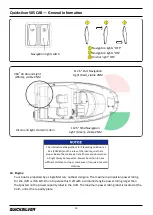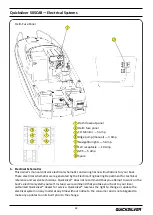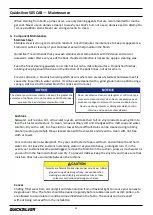
17
Quicksilver 505CAB — System & Component Overview and Operation
Never obstruct passageways to exits or hatches, obstruct
safety controls (fuel valves, LPG valves, electrical switches,
etc.) obstruct portable fire extinguishers stowed in lockers,
or modify any of the craft’s system (especially fuel, LPG, or
electrical) or allow unqualified personnel to modify any of
the craft’s system.
Fire Extinguisher
Fire Extinguisher
Fire port
4.
Carbon Monoxide Monitor
Quicksilver® boats are equipped with carbon monoxide (CO) monitors in the cabin and enclosed
berths or staterooms. Carbon Monoxide is an odorless, colorless, and tasteless, extremely toxic gas
produced by engines, heaters, stoves or generators. When inhaled it combines with hemoglobin in the
blood, preventing absorption of oxygen and is unlikely to be noticed until the person is overcome.
Prolonged exposure to low concentration or very short exposure to high concentrations can result in
asphyxiation and death.
Symptoms of Carbon Monoxide poisoning include dizziness, headaches, ringing in the ears, nausea, or
unconsciousness. GET MEDICAL ATTENTION AS SOON AS POSSIBLE. These symptoms are often
confused with seasickness or intoxication, so those affected may not receive the medical attention
they need. The poisoning victim’s skin often turns cherry red. If CO poisoning is suspected, have the
victim breath fresh air deeply. If breathing stops, resuscitate. A victim often revives, then relapses
because organs are damaged by lack of oxygen.
Carbon Monoxide Accumulation & Prevention
Carbon Monoxide can accumulate in dangerous concentrations anywhere in or around your boat
including on back decks, swim platforms, or in water around generator exhausts. CO can remain in
or around your boat at dangerous levels even if your engine is no longer running. To minimize the risk
of Carbon Monoxide poisoning, consider the following:
















































